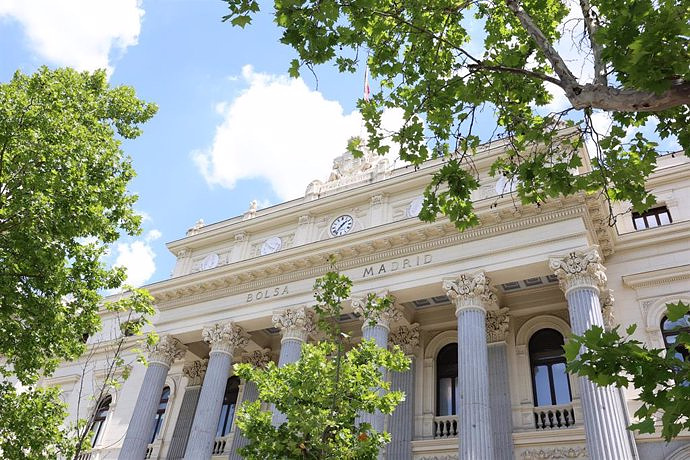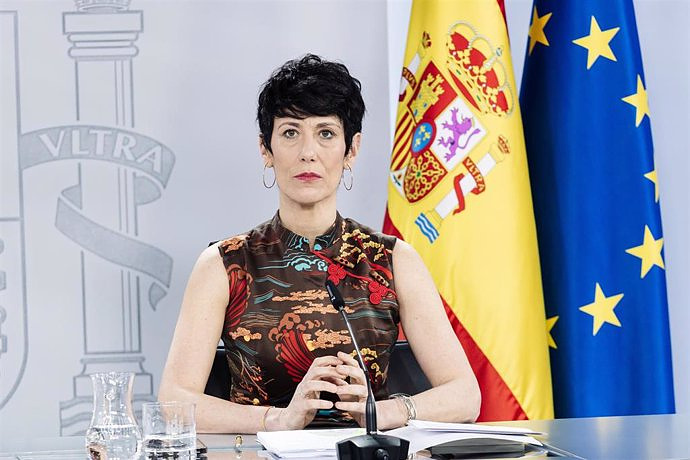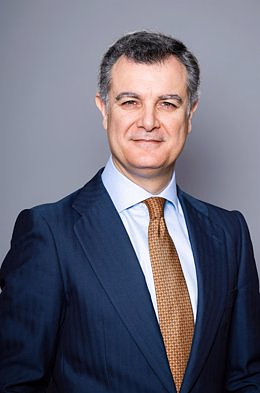The defenses request the acquittal and try to invalidate the statement before the Police, understanding that it was made without the proper guarantees
MADRID, 21 Dic. (EUROPA PRESS) -
The prosecutor of the National Court Marcelo Azcárraga has made his conclusions definitive and therefore maintains the request for 30 years in prison for the ETA members Óscar Abad Palacios, José Ramón Martínez and Carmen Guisásola Solozábal for the attack with a bicycle bomb that ended with the life of the policeman Ignacio Pérez Álvarez in Galdácano (Vizcaya) in January 1990.
In his report, the prosecutor has asserted that the evidence presented during the trial proves that the three participated in the events. And he has mentioned that this is inferred from the "abundant" circumstantial evidence, from the police statements of the defendants, from their appearances in court during the investigation, from other statements made in other oral hearings and that have been included in sentences and from various documents, vestiges and expert evidence.
A large part of his exposition, which has lasted for more than half an hour, has been dedicated to justifying that the police statement of the defendants should not be discarded despite the fact that at least two of the ETA members have denounced in the trial that there were under duress.
For Azcárraga, the proof of the police statement "is not absolutely disposable and useless material" according to the jurisprudence, and he has stressed that the denunciation of irregularities "is not valid." This position of the Public Ministry has been forcefully refuted by the three defenses of the ETA members, who assure that according to the Supreme Court's own doctrine, these statements should not be taken into account, so that this test is not valid.
The prosecutor has indicated that the police statement of the defendants was signed and that their rights were read and they were assisted by a lawyer, something that in his opinion is sufficient guarantee. In line, he has argued that the physical abuse denounced by Abad is not supported by any indication, since the forensic reports of the doctor who assisted him while he was hospitalized for the explosion in which he was involved, and which led to his arrest, do not confirm mistreatment some.
In line, he has stressed the relevance of his police statement because he provided detailed information that could only be given by whoever participated in the events and has insisted that in 1990 he already belonged to ETA according to judicial statements collected in other sentences.
In this sense, it has stressed that the statements were free and spontaneous, and that they were not obtained through torture. Furthermore, he has pointed out that the Atristain doctrine cannot be applied in this case. This doctrine is based on a ruling by the European Court of Human Rights (ECHR) that condemns Spain for violating the right of that ETA member to legal assistance of his choice and to a fair trial for preventing him from choosing a lawyer and only providing him with one ex officio for his statement at police headquarters while incommunicado.
Azcárraga has maintained that in this case the incommunicado orders of the ETA members have not been provided, so it is not possible to know if there was a specific individualization and if a trusted lawyer was allowed.
For the defense of Abad, who has sought an acquittal, the new jurisprudence "categorically expels this type of statement because there is no effective legal assistance." "The fact that there is a lawyer who signs is not enough," he indicated, to later add that his client also did not provide relevant information to the police, especially when the details of the attack with the bike.
In addition, he has focused on the fact that Abad testified in the hospital, incommunicado, with a net covering his eyes and with hearing loss, something that in his opinion means that "this statement is taken against any acceptable legal criteria." .
On the other hand, he has defended that the ETA member did not participate in the attack because the witnesses speak of people between the ages of 25 and 30, when he was just 18 years old and did not participate in ETA actions until the spring of 1991.
The defense of José Ramón Martínez, who, like the other two, has requested acquittal, has focused above all on the police statement to argue that it is the only element of accusation that the Prosecutor's Office has since they were not judicially ratified.
In line, like Abad's defense, the doctrine of the ECtHR has been sent that requires guarantees and that legal assistance must be effective. And he has added to this that the Supreme Court indicates that the police statement should be expelled from the body of evidence even if there is no limitation of rights because it is carried out in a situation of tension and with fewer guarantees than that which has an appearance before a judge.
After the presentation of the defenses, and given that the defendants have waived their right to the last word, the court has allowed the trial to be sentenced.
According to the prosecutor's indictment, collected by Europa Press, Abad Palacios and José Ramón Martínez "as members of the terrorist group ETA" activated by means of radio control the explosive device that they had previously left in the saddlebag of a bicycle that they had parked. next to the agent's vehicle. The explosion caused the death of the police officer, as they intended, the prosecutor says.
Regarding Guisasola's role, the Public Ministry says that it was she, along with ETA member Julián Achurra, who reported the information about the agent's daily activities to the other two, and provided the bicycle with the explosive device. In fact, the fiscal report indicates that both supervised the actions of those on behalf of ETA.

 Exploring Cardano: Inner Workings and Advantages of this Cryptocurrency
Exploring Cardano: Inner Workings and Advantages of this Cryptocurrency Seville.- Economy.- Innova.- STSA inaugurates its new painting and sealing hangar in San Pablo, for 18 million
Seville.- Economy.- Innova.- STSA inaugurates its new painting and sealing hangar in San Pablo, for 18 million Innova.- More than 300 volunteers join the Andalucía Compromiso Digital network in one month to facilitate access to ICT
Innova.- More than 300 volunteers join the Andalucía Compromiso Digital network in one month to facilitate access to ICT Innova.-AMP.- Ayesa acquires 51% of Sadiel, which will create new technological engineering products and expand markets
Innova.-AMP.- Ayesa acquires 51% of Sadiel, which will create new technological engineering products and expand markets Congress debates Sumar's proposal for unions to enter the boards of directors
Congress debates Sumar's proposal for unions to enter the boards of directors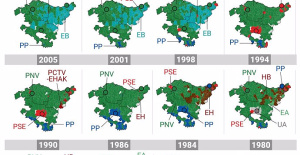 Historical results of the 2024 Basque elections, municipality by municipality
Historical results of the 2024 Basque elections, municipality by municipality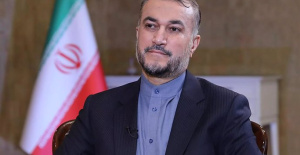 Iran assures that any action by Israel will have an "immediate and highest level" response: "They will regret it"
Iran assures that any action by Israel will have an "immediate and highest level" response: "They will regret it"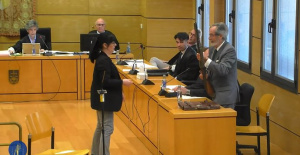 The Ciudad Real Court sentences the man who killed a thief with two shots in his home to 6 years
The Ciudad Real Court sentences the man who killed a thief with two shots in his home to 6 years How Blockchain in being used to shape the future
How Blockchain in being used to shape the future Not just BTC and ETH: Here Are Some More Interesting Coins Worth Focusing on
Not just BTC and ETH: Here Are Some More Interesting Coins Worth Focusing on València is committed to citiverse and smart tourism to be "the reference technological hub of the Mediterranean"
València is committed to citiverse and smart tourism to be "the reference technological hub of the Mediterranean" Valencia displays its "innovative and technological potential" at the Emerge Americas event in Miami
Valencia displays its "innovative and technological potential" at the Emerge Americas event in Miami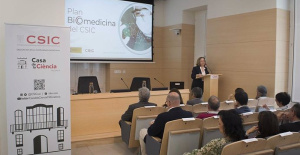 The CSIC incorporates the challenges of robotics, nanotechnology and AI in the new strategic plan for biomedicine
The CSIC incorporates the challenges of robotics, nanotechnology and AI in the new strategic plan for biomedicine Innovation allocates 9.1 million to train 74,000 people and guarantee digital inclusion
Innovation allocates 9.1 million to train 74,000 people and guarantee digital inclusion A million people demonstrate in France against Macron's pension reform
A million people demonstrate in France against Macron's pension reform Russia launches several missiles against "critical infrastructure" in the city of Zaporizhia
Russia launches several missiles against "critical infrastructure" in the city of Zaporizhia A "procession" remembers the dead of the Calabria shipwreck as bodies continue to wash up on the shore
A "procession" remembers the dead of the Calabria shipwreck as bodies continue to wash up on the shore Prison sentences handed down for three prominent Hong Kong pro-democracy activists
Prison sentences handed down for three prominent Hong Kong pro-democracy activists ETH continues to leave trading platforms, Ethereum balance on exchanges lowest in 3 years
ETH continues to leave trading platforms, Ethereum balance on exchanges lowest in 3 years Investors invest $450 million in Consensys, Ethereum incubator now valued at $7 billion
Investors invest $450 million in Consensys, Ethereum incubator now valued at $7 billion Alchemy Integrates Ethereum L2 Product Starknet to Enhance Web3 Scalability at a Price 100x Lower Than L1 Fees
Alchemy Integrates Ethereum L2 Product Starknet to Enhance Web3 Scalability at a Price 100x Lower Than L1 Fees Mining Report: Bitcoin's Electricity Consumption Declines by 25% in Q1 2022
Mining Report: Bitcoin's Electricity Consumption Declines by 25% in Q1 2022 Oil-to-Bitcoin Mining Firm Crusoe Energy Systems Raised $505 Million
Oil-to-Bitcoin Mining Firm Crusoe Energy Systems Raised $505 Million Microbt reveals the latest Bitcoin mining rigs -- Machines produce up to 126 TH/s with custom 5nm chip design
Microbt reveals the latest Bitcoin mining rigs -- Machines produce up to 126 TH/s with custom 5nm chip design Bitcoin's Mining Difficulty Hits a Lifetime High, With More Than 90% of BTC Supply Issued
Bitcoin's Mining Difficulty Hits a Lifetime High, With More Than 90% of BTC Supply Issued The Biggest Movers are Near, EOS, and RUNE during Friday's Selloff
The Biggest Movers are Near, EOS, and RUNE during Friday's Selloff Global Markets Spooked by a Hawkish Fed and Covid, Stocks and Crypto Gain After Musk Buys Twitter
Global Markets Spooked by a Hawkish Fed and Covid, Stocks and Crypto Gain After Musk Buys Twitter Bitso to offset carbon emissions from the Trading Platform's ERC20, ETH, and BTC Transactions
Bitso to offset carbon emissions from the Trading Platform's ERC20, ETH, and BTC Transactions Draftkings Announces 2022 College Hoops NFT Selection for March Madness
Draftkings Announces 2022 College Hoops NFT Selection for March Madness


